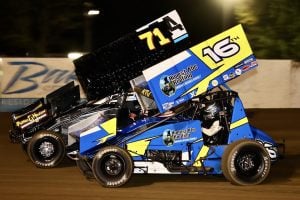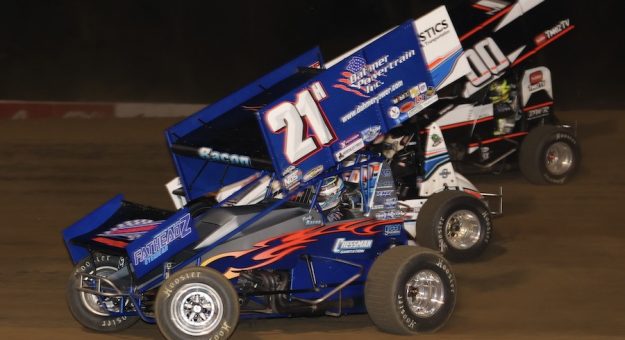The late Robin Miller’s declaration that “wings belong on airplanes, not on sprint cars” rang true for multiple generations of race fans across the state of Indiana.
However, winged sprint car racers and fans in the Hoosier State will have more races with larger payouts next season, thanks to an effort being spearheaded by Kevin Newton, CEO of Honest Abe Roofing.
Cale Thomas’ recent victory in the inaugural Honest Abe Roofing Winged Maverick Sprint Car Series event at Lincoln Park Speedway in Putnamville, Ind., paid him $6,000. It was Thomas’s first sprint car win in Indiana and his highest-paying triumph.
For comparison, his August victory at Ohio’s Fremont Speedway in the Attica Fremont Championship Series paid the Fairland, Ind., native $4,000.
While Illinois, Ohio and Pennsylvania are havens for winged sprint car racing, Indiana is an outlier. It is hoped this new series will be the first step in changing that.

The All Star Circuit of Champions did not race in Indiana this year, while the High Limit Racing Series visited Kokomo and Lincoln Park Speedways. The World of Outlaws invaded Tri-State Speedway near Haubstadt and stopped at Lawrenceburg Speedway.
As a result, there are numerous dates available for winged sprint car events.
That’s where Newton and promoters Joe and Jill Spiker enter the picture. Newton was tired of driving long distances to winged sprint car races and decided to create a series to do it better – and, more importantly, a lot closer to home.
“If you time how much throttle time you have on a sprint car, you’ve got like 14 minutes of throttle time of racing in reality,” Newton explained. “If you time a feature, it goes kind of green, most of the time it’s nine minutes of racing and you’ve got like three minutes in heat races, you’ve got 30 seconds of hot laps and you travel 10 hours to do that. For me, I don’t think it makes a lot of sense.”
Instead of driving four to five hours each way to a winged sprint car race in Michigan, Illinois or Ohio, Newton only had to travel 45 minutes to Lincoln Park from his home in Farmersburg, Ind., and he wasn’t the only one thankful for the short commute.
After winning the inaugural Maverick Sprint Car Series feature, Thomas’ drive home was an hour and 10 minutes. Indiana Sprint Week champion Brady Bacon drove two hours to get to Putnamville. Logan Seavey’s ride home was 45 minutes, while Thomas Meseraull’s commute was only 40 minutes.
Mostly competing in USAC midgets and non-winged sprint cars, Meseraull appreciates the opportunity to expand his racing calendar.
“Putnamville is my home track, I guess you would say,” said the California transplant. “I’m excited about winged racing in Indiana. It seems like the winged races pay a little bit better and they’re bringing it on with the High Limit Series that (Kyle) Larson’s doing. There’s just a lot of hype around the winged stuff, so I’m pretty excited that Honest Abe’s Roofing brought winged cars to Putnamville.”
The beginning of this new chapter in winged sprint car racing had some growing pains.
There was a miscommunication after drivers claimed what was said in the drivers’ meeting was different than the method used to set the B-main lineups.
There were other criticisms, as well.
Bacon finished third in his heat race and started 13th in the feature despite setting quick time during qualifying. The Broken Arrow, Okla., native would like to see some format changes ahead of next year.
“They’ve got a format that’s kind of the Indiana non-winged format, which doesn’t really work very well with wings,” Bacon noted. “We got penalized for being fast and if the track was a little better, we might’ve been able to pass a little bit, but he had it all packed down. He didn’t want it to be rough, which would’ve been worse than being slick. So a lot of rain yesterday and cool temperatures, it’s kind of hard to predict what the track’s going to do.”
The plan is to run approximately a dozen races next season split between Lincoln Park Speedway and Bloomington Speedway.
While future schedules may include additional tracks, the series will initially will be limited to those two ovals as the Spikers operate both facilities. That reduces logistical complications since series staff and track staff work for the same employer.
“It’s easy because the staff is already here at the race tracks,” Newton said. “So (the Spikers) are already doing that on a weekly basis, so this was easy. We’ll see how it goes. If they like it and they want to move and negotiate opportunities to race at other race tracks, obviously, I’m open for it. But once again, I don’t want to get too far away from home. That’s the whole goal.”
Bacon won the World of Outlaws feature at Tri-State Speedway this year, but he hasn’t raced much with the winged sprint car outside of the crown jewel events at Knoxville (Iowa) Raceway and Ohio’s Eldora Speedway.
By racing a winged car more often, drivers and teams will be able to build their notebooks. In turn, that knowledge will help those teams better compete when the Outlaws, All Stars or High Limit Sprint Car Series comes to Indiana.
“We don’t really get to keep up if we don’t race enough,” Bacon said. “We learned that what we used to do doesn’t work anymore, so we’ve got to kind of get back and do a little homework to get caught back up with everybody.”
Bacon and the rest of the competitors will need to keep up with their homework if the series is able to build on the momentum from its opening event.
There were 49 cars at Lincoln Park Speedway for the debut, so the future looks bright for the Mavericks.
This story appeared in the Oct 25, 2023 edition of the SPEED SPORT Insider.

